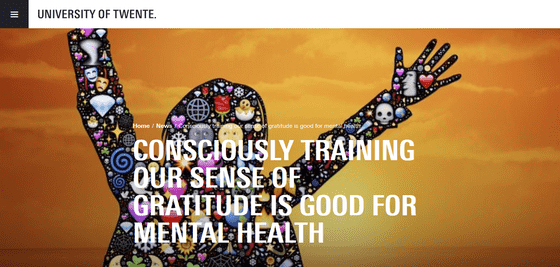What is 'thank you training' to improve mental health in just 15 minutes a day backed by science?

Everyone knows that 'it feels good to be grateful', but it has never been scientifically proven to improve feelings. A study by Ernst Bohlmeijer, a psychologist and mental health expert at the University of Twente in the Netherlands, confirmed that 'conscious gratitude improves mental health.'
Promoting Gratitude as a Resource for Sustainable Mental Health: Results of a 3-Armed Randomized Controlled Trial up to 6 Months Follow-up | SpringerLink
Consciously training our sense of gratitude is good for mental health | Home (EN)
https://www.utwente.nl/en/news/2020/5/631059/consciously-training-our-sense-of-gratitude-is-good-for-mental-health
Grateful perspective in life promotes mental well-being, finds study
https://medicaldialogues.in/psychiatry/news/grateful-perspective-in-life-promotes-mental-well-being-finds-study-66114

Bohlmeijer's research team recruits participants in psychology information magazines, newspaper advertisements, and social media to conduct experiments on ``adults with low happiness and mild mental health problems'' It was The applicants were then given online
The research team randomly divided the participants into three groups and conducted a six-week experiment. The first group practiced 'thank-you training' that combined the following six actions during the experimental period.
・Keep a diary and write down 3 happy events that occurred on that day and their reasons.
・If you find one thing that is commonplace in your daily life, such as 'clean water comes out of the water supply' or 'loved ones or pets are by your side', and if it disappears imagine.
・Write a thank you letter to someone who did something good for you. You can send the letter by mail or e-mail, or send it directly when you meet.
• Write down as much as you can about the events in your life and thanks to those you have met.
・Conversely to the above, write about the difficult events that occurred in the past, such as positive changes obtained from the experience.
・Every morning for 5 minutes, be aware of being grateful for things.
According to the research team, the time required for this training is estimated to be 15 minutes per day and around 75 minutes per week.

The second group had them choose one day out of the week to carry out 'five rewards for themselves.' The specific content of the 'reward' is left to the judgment of each person, except that it is 'special things that I haven't done much before.' For example, 'make a special coffee' and 'I like it.' Healed yourself with various magazines and meals, 'Spend time on hobbies,' 'Go for a walk.' The time required to perform the five actions is estimated to average about 75 minutes each.
The third and final group was a control group that did nothing. However, in order to prevent it from affecting the psychology of the participants, participants in this group should 'find some activity that will help them achieve their happiness within 6 weeks'. He was instructed to do the activity after the experimental period.
After each group was tested for mental health after the experiment period, a thank-you training was performed on multiple items such as 'happiness,' 'gratitude,' 'satisfaction,' and 'joy.' The results of the eye group exceeded the results of the other groups. The difference was particularly noticeable in 'happiness', where about one-third of the first group showed increased happiness, while the second group had 19.2%, the third. Was 13.6% in the group.

Bohlmeijer commented on the result: 'The point is not to neglect negative experiences, but to be grateful for the good side of life while facing difficulties and psychological distress. It is the resilience of the mind. It is the essence of ' resilience .'
Based on the results of this research, the research team is developing a free application that can do thanks training by themselves, and it is scheduled to be released around September 2020.
Related Posts:
in Science, Posted by log1l_ks







